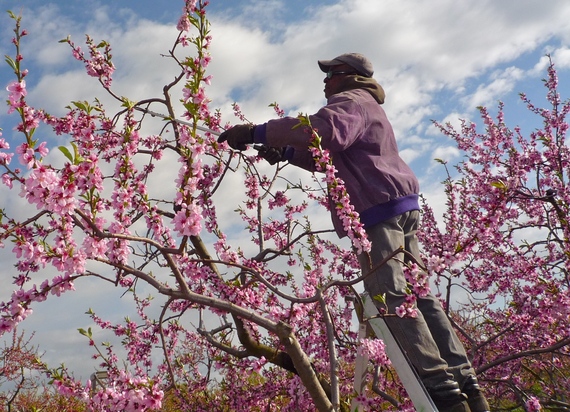
Near my rural home in southern Manitoba, I walk out to meet 11 Mexican men bent over weeding a large field of organic onions by hand. They make minimum wage and work long hours.
Their employer can send them home at any time or not call them back next year. They can stay in Canada for up to eight months each year but their families must stay home.
They are the lucky ones.
They are among the 26 Mexicans employed by Winkler, Manitoba-based Kroeker Farms--one of Canada's largest organic vegetable producers--and they are among about 30,000 workers who come to Canada each year from Mexico and the Caribbean as part of the Seasonal Agricultural Worker Program (SAWP). The federal program is in its 50th year.
They are lucky because back home, some of them make C$3 an hour in the off-season.
Similarly, the Jamaican workers I spoke with informally in the Niagra region of Ontario are the envy of many of their countrymen. Minimum wage is less than C$2.00 in Jamaica and positions in the program are coveted.
In some ways, SAWP is an ideal arrangement: well-suited workers from needy countries fill a seasonal labour niche here. Kroeker Farms CEO Wayne Rempel and head of human resources Ed Klassen tell me that without seasonal workers, the farm would be forced to scale back the organic side of its operation.
The 26 Mexicans do the work 130 Canadians did, with untenable turnover and recruitment hassles, prior to the farm joining the program three years ago.
The two farmers I spoke with in the Niagara region said the same thing. Rene Schmitz, who runs a fruit and rose farm, would have to grow other crops without seasonal workers. Canadians simply will not do the work.
The program is a good match between eager workers and employers. As Rempel says, "We need them, and they need us." Win-win.
Unless you are the son back home who celebrates his birthday every year without his dad or the wife forced to single-parent. Some program participants spend two-thirds of every year in Canada for 20 or 30 years.
For a 2013 report, Jodi Dueck-Read -- an instructor at Menno Simons College at the University of Winnipeg -- conducted in-depth interviews with eight Mexican seasonal workers in Manitoba. Many spoke about "la lucha," a ubiquitous working-class term in Latin America that refers to the struggle or battle of life. One worker said he tells his kids he suffers in Canada: "You work all day, and if you want to eat, you have to cook for yourself."
In the report, workers said their Canadian experience revolves almost solely around work. "Here, everything is work," one told Dueck-Read. Loneliness was another theme.
Most said they make these sacrifices for the sake of family, often kids' schooling. Of course, the jobs that help them provide for their families also take them away from their families. Workers may miss the births of children, deaths of parents or other significant events.
Still, Klassen says Mexican workers contact Kroeker Farms during the winter hoping to be called back. Rempel notes that on average 15 people back in Mexico depend on each worker.
How do the employers feel about their workers being away from family? Schmitz pauses. Rempel hesitates. "That's a tough one," he says. "They pay that price," Schmitz says.
The three employers I spoke with note the workers come voluntarily and repeatedly. The defence of the program rests on this point.
But to what extent is their "choice" to come forced on them by a limited range of options? Jamaican workers I spoke with during a March visit to Ontario lamented the dim employment prospects at home.
"They pay a high price no matter how you slice it," Schmitz says. They pay a high price so we don't have to.
In some cases, injured workers get sent home instead of receiving treatment here. At times, workers who have spent 30 years at a farm do not get so much as a handshake or "thank you" upon retirement. Many workers fear reporting health issues, raising concerns or talking to reporters lest they be blacklisted. Some employers are compassionate and conscientious, but there is limited protection or recourse for employees of farmers who are not.
The theoretical solution to the shortcomings of the seasonal-worker program is a world in which everyone can make a dignified living close to home. A more practical solution is for seasonal workers to be granted a pathway to citizenship. If the 11 men I met in the field are good enough to work here, they are good enough to be my neighbours, permanently, if they wish.
Rempel would "love" for the workers at Kroeker Farms to be allowed to stay in Canada, saying, "We need people like that in our country."
On this point, a federal spokesperson would say only that a parliamentary committee is reviewing the program, and the government will "bring forward its plan later this year to improve and change the program."
In the meantime, 30,000 lucky foreigners will pick our peaches and weed our onions while their families back home await phone calls, wire transfers and the return of their loved ones.
Will Braun lives near Morden, Manitoba. A version of this article first appeared in Canadian Mennonite magazine.
